Grady Thornton: A conservative Republican’s plea to lawmakers on medical marijuana

I am aware your role in state government is sometimes thankless and contentious. Therefore, I address you with only the greatest respect and as briefly as practical. I am aware some legislators are strongly opposed to the medical marijuana legislation that will be considered Monday, the last day of the 2021 session. This will be the last chance this year the leaders will have to say “Yea” or “Nay” to a proposal that could provide comfort to the dying: our mothers, our fathers, our sons, daughters, grandchildren, and thousands of God’s children we will never meet. I am begging, yes begging you, to drop your opposition to the medical marijuana bill or hold fast to your support, whichever the case may be. Some of you have stated your reason to oppose it is for personal reasons. I, too, have personal reasons to hope for approval: I watched my brother die of cancer. He was a strong man, an officer in the Alabama National Guard, and the most devout patriot I have ever known. We knew death was winning the battle for life, and we were helpless to stop it. However, medical marijuana could have alleviated the excruciating pain he had to endure for his final 18 months in this world. Pain that left him delirious at times, unconscious at times, and weeping at times. We loved him so much, and knowing we were losing him was the greatest sorrow my family had ever experienced. That great sorrow was intensified, not only by his death but his suffering. In all medical probability, medical marijuana could have caused the horror of his last days to be less horrible. I do not use recreational marijuana, and I oppose its legalization. Medical marijuana is not about getting high. It is about peace in the flickering candle of life as it nears the final glow. It is about a period when one of our fellow human beings sees the horrifying approach of his/her own death nearing their bed. It is about the comfort of seeing this pain of a loved one being lessened in a way no current synthetic medication can. It is about lessening the impact of young children, like my nephews, when their lives and family were torn apart. Their sadness, the loss, the feelings of abandonment, the anger, their grief was exacerbated by seeing the intensity of their daddy’s suffering. Those emotions will never go away. Some of you are worried about addiction. I understand that, but there is no credible evidence to support that. Medical marijuana is formulated to prohibit this. Will there be misuse? Probably, but when the wayward realize they will not get high, it will not be a public health issue. Medical marijuana is NOT a gateway drug. I have generational addiction in my bloodline. I would never promote anything that could cause addiction or relapse. Medical marijuana is a solid pro-life concept. It seems reasonable to make a drug from a drug. When I had significant stomach disorders as a teen, I drank what seemed like gallons of a chalky over-the-counter medication. One of the active ingredients was opium. I do not think there are many Maalox addicts my age. Please consider overriding the opposition to this legislation and do not push for amendments. The well-being of thousands, maybe tens of thousands, of Alabamians is in your hands. Please do not enable the well-intended but misinformed to force torture on those who are dying or have illnesses that can be so treated. I leave you with the very statement with which I opened: your job is sometimes thankless and contentious. I, however, honor you for the many sacrifices you make to be a public servant. I appreciate you for taking the time to hear me out. God bless you all. Grady Thornton is a Southern Baptist Sunday School teacher and a member of church committees, a supporter of Second Amendment rights, and a Republican. He is a member of the Alabama Republican Party Executive Committee, the Shelby County Republican Executive Committee, Steering Committee, and Zone Coordinator. He is a member of the Alabama Minority GOP, Associate Member of a Republican women’s club, a volunteer for selected Alabama Federation of Republican Women events, and a volunteer on many Republican activities in the past.
Justin Bogie: Alabama legislature continues to consider medical marijuana. Is it to help people, or make money?

Late into Tuesday night, in the waning hours of the 2021 Regular Legislative Session, the House of Representatives spent nine hours passionately debating Senate Bill 46, which would legalize the use of medical marijuana in Alabama and create a cannabis commission akin to the ABC Board on steroids. No vote was held, but debate will continue Thursday with a vote possibly coming any time. The bill’s sponsor, Senator Tim Melson, and other proponents of the bill claim that it would provide an alternative to patients who haven’t gotten pain and symptom relief through the use of conventional medicines. While that point is debatable, two others are not. Possessing or selling marijuana is illegal under federal law. If Alabama legalizes medical marijuana, it will do so in direct defiance of those laws. But sometimes greed outweighs legality. Medical marijuana is a multi-billion dollar business. If the bill passes, those chosen by the state to grow, process, and dispense the drug could see a windfall of profits. Of course, state government would also take its cut in the form of new tax revenues and license fees. State governments nationwide are trampling on federal law and health guidelines so that government, and those fortunate to be chosen by government, can make lots of money. The federal government poses a risk to the marijuana cash cow. If anyone could grow and possess marijuana, there would be little demand for large farms, processors, dispensaries, etc. That’s why pro-marijuana groups spend millions of state-level dollars each year trying to convince legislatures to legalize marijuana now and beat the federal government to the punch. The 2021 session marks the third recent attempt by the Alabama Legislature to join the District of Columbia and 36 other states that have legalized the use of medical marijuana. Under the current proposal, individuals diagnosed with one of 16 conditions would be eligible for a prescription. One argument made by proponents for its legalization is that so many other states have done it. Justifying legalization because other states have adopted bad (and illegal) policy is a weak argument. The other argument is that medical marijuana will truly benefit people with chronic conditions. But the research on that is murky at best. For every study expounding the benefits of medical marijuana, there’s another warning of the dangers and ineffectiveness of its use. There is also the fact that the Federal Drug Administration (FDA) has not approved marijuana for medical use. In addition to violating federal law, states authorizing the use of medical marijuana have taken it upon themselves to make a medical determination that the FDA has been unwilling to do. So why are state governments willing to legalize and approve the use of medical marijuana when the federal government is not? What proponents of Senate Bill 46 leave out when singing the virtues of its use is the fact that it’s also big money. Individuals and businesses selected by the state to participate in the process would reap millions of dollars in financial benefits. In addition to states already allowing medical use, 14 states have legalized recreational marijuana. In 2020, marijuana sales totaled $17.5 billion, an increase of 46% compared to 2019. BDSA, an analytics firm, estimates that by 2026 industry sales will more than double. According to marijuana industry data, medicinal sales alone totaled $5.8-$7.1 billion in 2020. In addition to lining the pockets of growers, processors, and distributors, this booming industry also means more money for state government. Tax revenues from medical marijuana sales totaled an estimated $287-$345 million last year. On the recreational side, California and Washington alone brought in nearly $1 billion in tax revenues last year. We should hope that those advocating to reject federal law and legalize medical marijuana in Alabama are doing so because they want to help those suffering from chronic medical conditions that have exhausted all other treatment options. But let’s be clear, it’s also about the money. Justin Bogie serves as the Alabama Policy Institute’s Senior Director of Fiscal Policy. API is an independent, nonpartisan, nonprofit research and educational organization dedicated to free markets, limited government, and strong families, learn more at alabamapolicy.org.
Prison changes, lottery bills postponed as session cut short
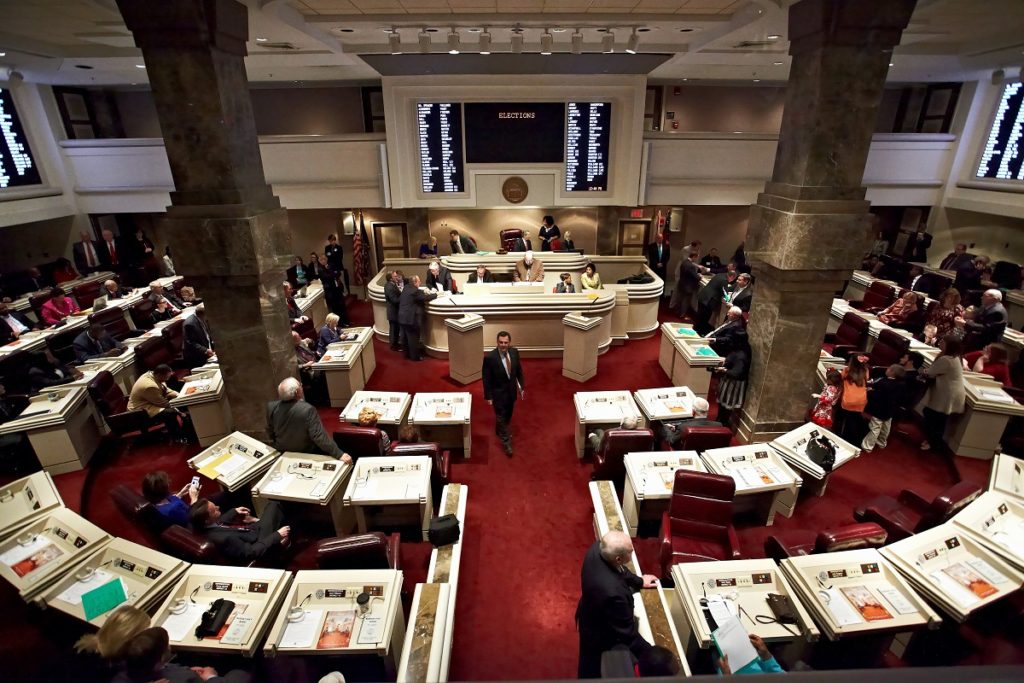
Lawmakers used their abbreviated meeting time to focus on state budgets and passing a $1.25 billion bond issue to fund school construction.
Senate approves medical marijuana bill
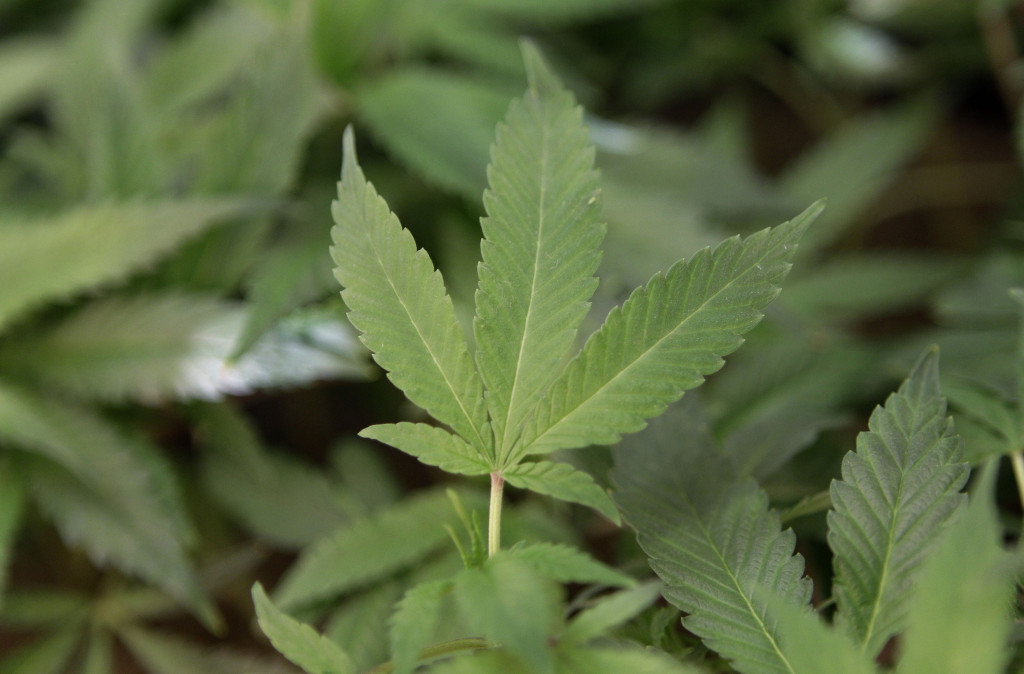
The Senate voted 22-10 to send the bill to the House of Representatives.
Senate to debate medical marijuana bill

The medical marijuana bill is headed for its first floor vote in the Senate today.
Medical marijuana bill clears Alabama Senate committee
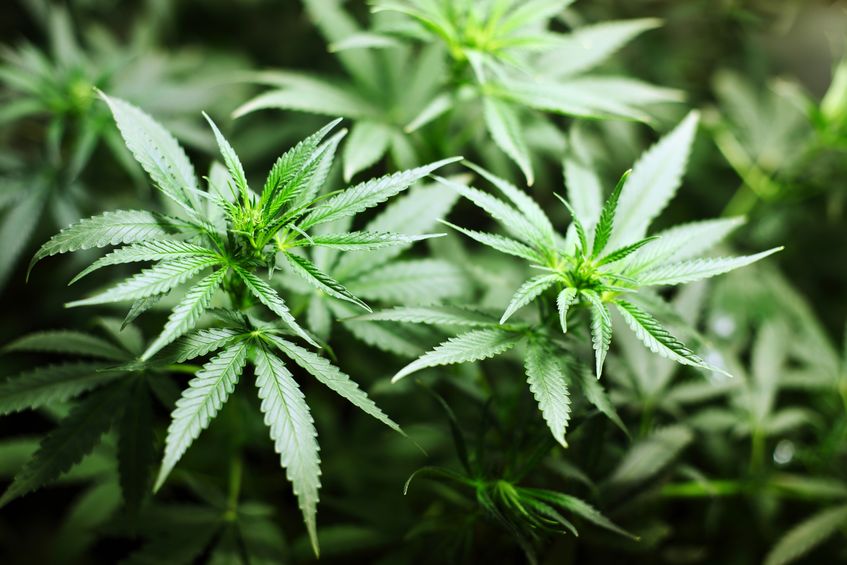
Senate Judiciary Committee members voted 8-1 for the bill, sending it to the full Senate.
Corrections, gambling to be focus of legislative session
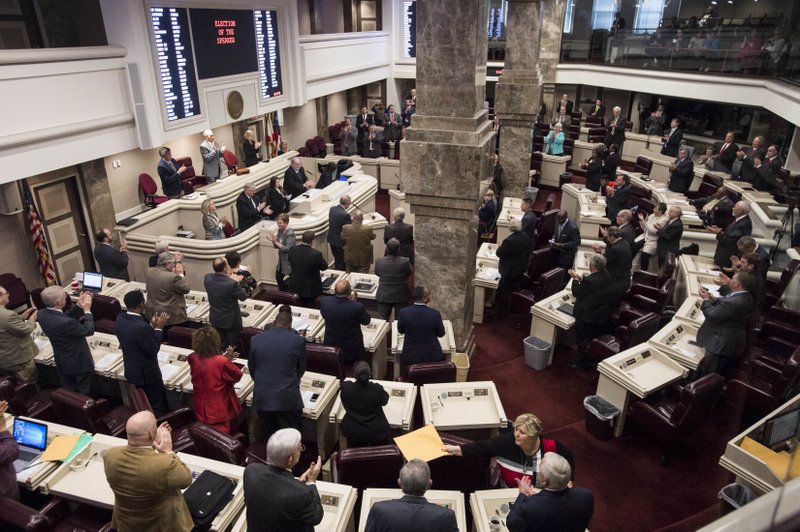
The state prison crisis is expected to take center stage in the legislative session.
Medical cannabis group begins drafting bill

An Alabama commission considering laws about medical marijuana met at the State House to discuss the draft of a medical marijuana bill that’ll be introduced to the Legislature next year. News outlets report the Medical Marijuana Study Commission met Thursday, the last time they’ll meet before the Dec. 1 filing deadline. Sen. Tim Melson, and commission chair, asked commission members to study the proposal and make any recommended changes. Melson championed a medical marijuana bill last spring. It went through the Alabama Senate but stalled at the House. The bill would create a Medical Cannabis Commission to manage issuing medical cannabis cards to patients. The bill would empower the commission to add or remove qualifying conditions based on scientific evidence.
Medical marijuana bill headed to Alabama Senate floor vote

A medicinal marijuana bill has moved one step closer to a floor vote in the Alabama Senate, where it faces an uncertain future. The Senate Judiciary Committee voted 6-2 for the bill after a brief public hearing Wednesday. It now moves to the full Senate where the proposal has previously met resistance. Republican Sen. Tim Melson of Florence acknowledged he has work to do to alleviate concerns about his bill before it goes to a floor vote. The bill would set up state oversight, regulations and a process for prescribing marijuana to treat certain conditions. Patients with a valid medical cannabis card could not be charged with the crime of marijuana possession. “This isn’t Cheech and Chong smoking a bong. This is about treating patients and having tight control,” Melson said. Gena Dalton of Madison walked the halls of the Statehouse with her 6-year-old daughter Charlotte to ask lawmakers to support the bill. Charlotte has Dravet syndrome, a form of epilepsy. She had been debilitated by daily seizures and had to use a wheelchair, but improved greatly after being treated with cannabis oil, her mother said. “She is walking and talking. She got to go to swimming. … All of that would have been impossible,” Dalton said. Dalton said as Charlotte grows, she needs doses that are currently illegal under Alabama’s marijuana law. Opponents asked lawmakers to keep all marijuana illegal. They argued marijuana’s effects have not been adequately studied, particularly on children, and legalizing medical marijuana would send the wrong message to young people about the drug. “This is the first step into recreational use,” said Clay Hammac, who does narcotics enforcement for the Shelby County Sheriff’s Office. “We should have the bold conviction in saying this is a drug. I don’t care what the industry is saying, the multi-billion dollar industry is saying. … We need to be steadfast in our stance and say this is not a healthy alternative.” Republican Rep. Mike Ball, a former state trooper, is sponsoring the bill in the House. “The public gets it. That’s not a problem. It’s mostly political. It’s fear in politics,” Ball said. He also led the earlier push to allow cannabis oil. “If five years ago, if somebody told me I’d be the marijuana guy, I would say nooooo,” Ball said dragging out the word no. “But I’m an investigator. I followed the evidence and here I am.” Republished with the permission of the Associated Press.
Roy Moore blasts Mo Brooks ‘ridiculous’ stance on marijuana legalization
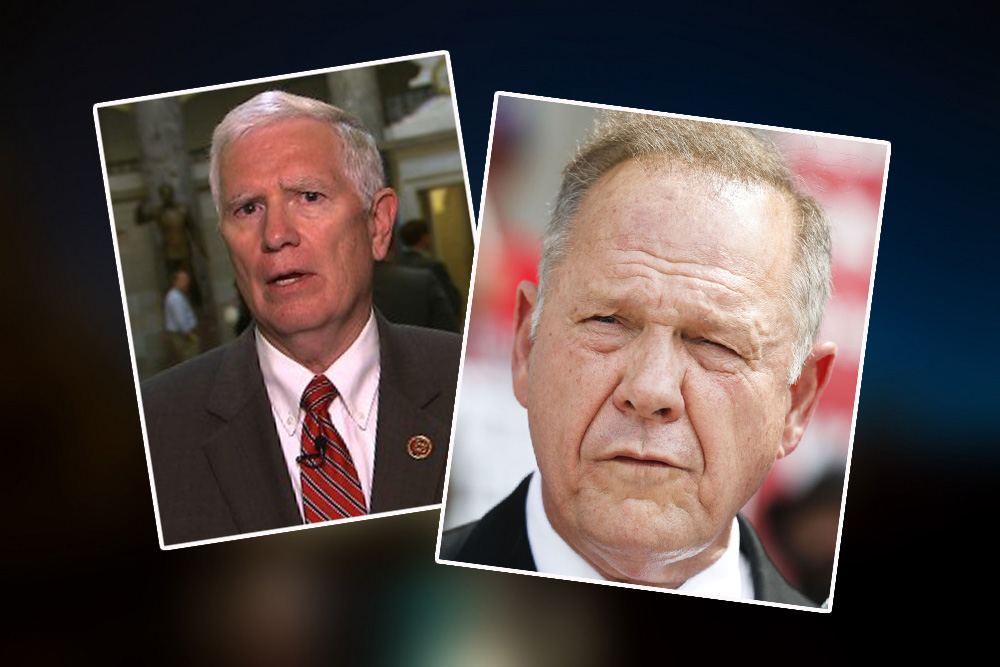
This week, Alabama Congressman Mo Brooks, in a heated race for the U.S. Senate seat now occupied by Luther Strange, declared his support for legalizing medical marijuana. Taking that stance during a Senate race is “absolutely ridiculous,” said former Alabama Supreme Court Justice Roy Moore, also running in the special election to serve the remaining term of Attorney General Jeff Sessions. The United States faces bigger, more pressing problems, Moore said, and those issues are what should be addressed during a Senate race, not whether to legalize medical marijuana. On Monday, Brooks made the declaration at a news conference streamed on Facebook, the same day fellow Senate candidate Dom Gentile — whose wife has cancer — dropped out of the race to endorse Brooks. The Huntsville Republican said: “Medical cannabis should be treated like any other medical treatment that saves lives or eases pain and symptoms … That is what I believe. That is how I will vote in the Senate. That is how I have voted in the House.” Appearing on WYDE Wednesday, Moore slammed Brooks’ position as a non-starter. “I think it’s ridiculous to concentrate on a matter like that as a United States Senator which should be left to the states,” Moore said on The Michael Hart Show. “I mean we got North Korea threatening to nuke us, we got a health care system that’s broken and costs everybody, an immigration system that’s risking the security of our national security because of people flowing across the borders; we’ve got unfair trade agreements … I could go on and on … we got judges thinking they rule the world.” “About an issue like this,” Moore added, “leave it to the states.” As for legalization of medical marijuana, it continues to be a hotly debated issue, particularly over the possibility of increased use among youths. A new report from the American Academy of Pediatrics found as more states legalize the drug for adult use, a greater number of teenagers think it is safe. This leads to rising concerns by doctors and other medical professionals that teens are underestimating the risks of marijuana use. “Marijuana is not a benign drug for teenagers because it affects their developing mind. Teenagers are at a critical time of brain development and they have lifelong impacts from marijuana during adolescence,” Dr. Stephen Patrick of Vanderbilt University Medical Center told Chris Martinez of CBS New York. “People living in states with legalized medical marijuana are more likely to use and abuse cannabis than people living in states where pot remains completely illegal, says a new study that cautions policymakers,” wrote Trevor Hughes in an April 26 piece for USA Today, reporting on a recent study funded by the National Institutes of Health. In July 2015, the South Florida Sun-Sentinel reported on a study by Florida International University finding legalized medical marijuana could lead to increased marijuana use by teenagers. According to research by FIU criminal justice professor Lisa Stolzenberg, legalized medical marijuana in Florida marijuana could lead to increased pot use by youths, similar to what happened in other states that passed laws allowing marijuana for the treatment of pain, nausea, vomiting and other medical conditions. The study also cited statistics for 2010-11, the most recent year in the study, where 9.7 percent of high school students reported using pot in states with legalized medical marijuana, compared to only 6.8 percent in states where it was illegal. Marijuana use among youth in states that legalized rose consistently since 2004, staying higher than in states where it’s illegal. In the Alabama Senate race, Roll Call reports recent internal polling puts Moore in the lead with 27 percent, Strange at 23 percent and Brooks at 21 percent. If no candidate reaches 50 percent plus one in the Aug. 15 special primary, the top two vote-getters will face a runoff Sept. 26; the general election is Dec. 12. Moore’s appearance can be heard here:
Medical marijuana advocates up in arms over Jeff Sessions
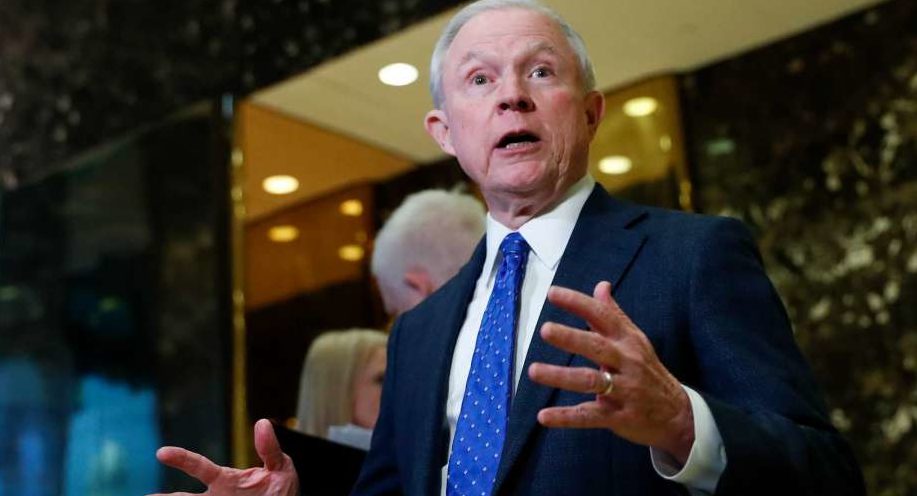
The head of a medical marijuana advocacy group is criticizing President-elect Donald Trump’s pick of Jeff Sessions for U.S. Attorney General. Steph Sherer, executive director of Americans for Safe Access, said in an email Friday that the Republican Sessions “has criticized the morality of cannabis users and has stated that cannabis is more harmful than alcohol.” Sessions, a former federal prosecutor, once “rebutted (President) Obama’s observation that marijuana is safer than alcohol by citing a renowned expert on substance abuse: ‘Lady Gaga says she’s addicted to it and it is not harmless,’” according to Forbes. On the other hand, Sherer said, Trump “repeatedly said he supports medical cannabis and that he believes states should be able to set their own policies in this area.” The president-elect “needs to reassure the more than 300 million Americans living under some sort of medical cannabis law that his attorney general will honor his campaign pledge to respect state medical cannabis programs,” Sherer said. “Plain and simple, medical cannabis is a critical therapy used by millions of patients to alleviate symptoms of epilepsy, chemotherapy, HIV/AIDS, chronic pain, and more,” she added. Twenty-eight states and the District of Columbia have decriminalized medical marijuana under state law, according to the National Conference of State Legislatures. A ballot initiative giving Floridians a state constitutional right to medical pot passed earlier this month with 71 percent of the vote. But marijuana is still outlawed by the federal government. The Obama administration has given states a pass, saying federal prosecutors should not charge those — particularly “the seriously ill and their caregivers” — who distribute and use medical marijuana under a state law.
Business owners replace idealists in legal-pot movement

Business owners are replacing idealists in the pot-legalization movement as the nascent marijuana industry creates a broad base of new donors, many of them entrepreneurs willing to spend to change drug policy. Unlike in the past, these supporters are not limited to a few wealthy people seeking change for personal reasons. They constitute a bigger coalition of business interests. And their support provides a significant financial advantage for pro-legalization campaigns. “It’s mainly a social-justice movement. But undoubtedly there are business interests at work, which is new in this movement,” said Kayvan Khalatbari, a one-time pot-shop owner and now head of a Denver marijuana consulting firm. The donors offer a wider foundation of support for the marijuana-related measures on the ballot next month in nine states. The campaigns are still largely funded by national advocacy organizations such as the Drug Policy Alliance, the Marijuana Policy Project and the New Approach PAC. But those groups are less reliant on billionaire activists. On the other side, legalization opponents are attracting new support from businesses as diverse as trucking, pharmaceuticals and even gambling. In 2012, Colorado and Washington became the first states to pass ballot initiatives legalizing recreational marijuana for adults. Oregon, Alaska and Washington, D.C., followed in 2014. The result is a bigger pool of existing businesses that see expansion potential in more states authorizing use of the drug. Take Darren Roberts of Boca Raton, Florida, co-founder of High There!, a social network for fans of pot. He donated $500 this year to a campaign to legalize marijuana for medical purposes in Florida. Roberts is also encouraging his customers to donate to legalization campaigns in their own states. “I would say it’s a combination of both the philanthropic social interest and the potential financial interest,” Roberts said. All five states considering recreational marijuana — Arizona, California, Maine, Massachusetts and Nevada — have seen more money flowing to groups that favor legalization than to those fighting it. The same is true in the four states considering starting or reinstating medical marijuana — Arkansas, Florida, Montana and North Dakota. The donors who contribute to anti-legalization efforts have changed, too. Some deep-pocket donors who drove opposition campaigns in years past are opening their pocketbooks again. Casino owner Sheldon Adelson of Nevada, for example, gave some $5 million in 2014 to oppose a medical-pot measure in Florida. This year, as his home state considers recreational pot and Florida takes a second look at medical marijuana, Adelson has spent $2 million on opposition in Nevada and $1 million to oppose legalization in Massachusetts. Other casinos are donating to Nevada opposition efforts, too, including MGM Resorts International and Atlantis Casino & Resort. Nevada gambling regulators have warned that marijuana violates federal law. Some new opponents have also emerged, moving beyond the typical anti-pot base that includes law enforcement groups, alcohol companies and drug-treatment interests. A pharmaceutical company that is working on a synthetic version of marijuana’s psychoactive ingredient, Insys Therapeutics Inc., has given at least $500,000 to oppose full marijuana legalization in its home state of Arizona. The company did not return a message for comment on the donation. Company officials said in a statement last month that Insys opposes the Arizona ballot measure because marijuana’s safety has not been demonstrated through the federal regulatory process. Other new names popping up in opposition disclosures include U-Haul, which gave $25,000 to oppose legalization in Arizona, and Julie Schauer, a Pennsylvania retiree who gave more than $1 million to a group opposing legalization. Neither returned messages seeking comment on their donations. Smaller donors to opposition campaigns say they are hopelessly outgunned by the young pot industry, but are giving out of a sense of duty. “Everyone’s talking about it like it’s a done deal, but I can’t sit by when I’ve seen firsthand the destruction that marijuana does to people,” said Howard Samuels, a drug-treatment therapist in Los Angeles who donated some $20,000 to oppose recreational legalization in California. Samuels and other marijuana opponents insist that the pot industry cynically hopes to get more people addicted to the drug to line its own pockets, comparing pot providers to tobacco companies. But marijuana-industry donors insist that they are simply carrying on a tradition started by the tie-dye wearing drug activists who pushed legalization long before there was any business model attached to it. They insist they would contribute financially even without any money-making potential. “When a movement becomes an industry, of course the advocacy picture gets shuffled,” said Bob Hoban, a Denver attorney specializing in marijuana law and a $1,000 donor to the Marijuana Policy Project. “It shifts away from activists to more traditional business interests, because the skill sets don’t exactly transfer.” Republished with permission of the Associated Press.


